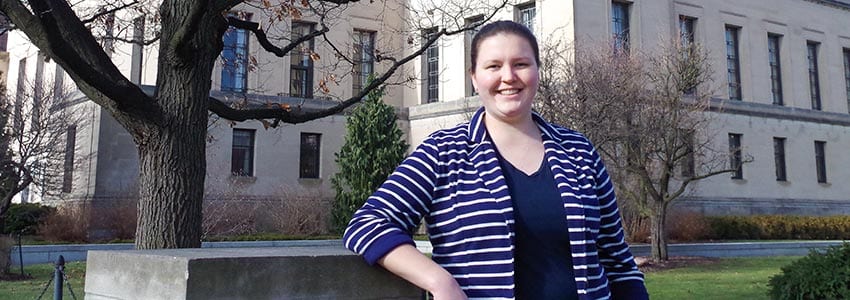As a 4th year Ph.D. candidate in Sociology, Heidi Gansen is at home here at the University of Michigan. Originally from Iowa, she attended nearby University of Northern Iowa for her bachelor’s in Sociology and Criminology and then for her Master’s in Sociology. Moving to Michigan had to be a sure thing for her to venture far away from her home base; and it was.
She says, “Grad school has been great! When I visited the sociology program and met with faculty here at Michigan, I knew this is where I wanted and needed to be. Faculty mentoring relationships here are so important. My faculty advisor and mentors are extremely supportive and willing to meet, provide feedback, review drafts, answer questions, work on collaborative projects, prepare publications, and help me develop myself as a scholar. Even faculty members outside my areas of interest are happy to help as well. Sociology at U-M is consistently rated one of the top programs in the nation, and some of the top scholars in my fields are here. This is a great place to cultivate myself and learn from the best.”
She continues, “Our department is collaborative in nature and there are great opportunities to get feedback from my peers, particularly through our department workshops. I am a regular participant and co-graduate student coordinator for our department’s Gender & Sexuality Workshop. The workshop provides a great opportunity to get feedback on my work and to facilitate discussion and open dialogues with peers in my field. There have also been opportunities within the sociology program, whether through coursework or preliminary exams, to learn about different research areas. These opportunities were beneficial as they added new perspectives to my work.”
Heidi’s research interests center on childhood, gender, and qualitative methods. Her dissertation broadly focuses on the role of preschool disciplinary practices in early socialization. She spent 10 months observing 3-5 year olds in 9 preschool classrooms at three child care centers throughout the state of Michigan. She also conducted interviews with 39 preschool teachers and directors. Currently Heidi is sifting through her data and analyses to find the narratives for her dissertation chapters. She explains, “I am interested in how children are socialized through preschool disciplinary practices. Specifically, how children learn about appropriate and inappropriate behavior and the messages children receive through teachers’ disciplinary practices; whether these disciplinary practices be corrective statements like ‘don’t do that,’ or consequences like, ‘go sit in the timeout chair.’ I’m also interested in how children’s gender, race, and social class shape teachers’ understandings of appropriate and inappropriate behavior and thus affect disciplinary outcomes in terms of the consequences children receive from their teachers.”
She shares, “After my Master’s, I became really interested in preschool discipline and I’ve always been interested in gender and childhood. In our current landscape, there are serious and significant gender and race disparities in terms of disciplinary outcomes beginning in preschool, especially when you look at the high rates of preschool suspension and expulsion for boys, particularly African American boys. We see from a larger policy level there are these disproportionate disciplinary outcomes beginning in preschool and that they are gendered and racialized. But we know less about teachers’ understandings of appropriate and inappropriate behavior, what discipline approaches teachers use, and under what circumstances teachers apply these disciplinary approaches in preschool classrooms. Through my dissertation, I want to provide a qualitative account of how disciplinary practices are applied in preschool classrooms, paying close attention to how children’s gender, race, and social class affect disciplinary practices and outcomes.”
Coming to Michigan was made easier by the generous funding she received: “I am absolutely in awe of the abundance of funding opportunities for us. The fact that there are so many opportunities to fund ourselves is wonderful. Especially as a qualitative researcher who needs funding for data collection, transcription, and analysis, that is so helpful. Coming to Michigan, with my Master’s, I had a pretty clear idea of what research I wanted to do and the funding helped me to do that quickly, by making it possible to begin collecting data and analyzing data early on. The Rackham Summer Award in particular, gave me the time I needed this past summer to complete the analysis of my observation and interview data, and begin to craft my dissertation chapter arguments. Also, I’m a first generation college student and I put myself through undergrad. Receiving funding like the Rackham Debt Management Award helped relieve some of that stress. We are blessed here at Michigan to have the funding we do, and I am so thankful for the funding I have received.”
Heidi hopes to pursue a faculty position when she finishes her doctorate. She says, “I would like to pursue a faculty position that allows me to teach and continue research. I am passionate about teaching and I enjoy mentoring students through their own personal ‘light bulb’ moments; whether these moments be conversations with students in which they realize their occupational goals, the first time they learn about a new aspect of our social world, helping them craft an argument that they like and feel strongly about for a paper, or when they begin to think critically about elements of our society with a new perspective. I remember having those lightbulb moments in the classroom as a student, and being able to facilitate these moments and provide different exposure for others as an instructor, has been great.”
For fun, you’ll find Heidi outside, “…doing anything. I love to be outside. I have two dogs and I’m often going on walks or hanging out with them; they are a nice distraction.”

